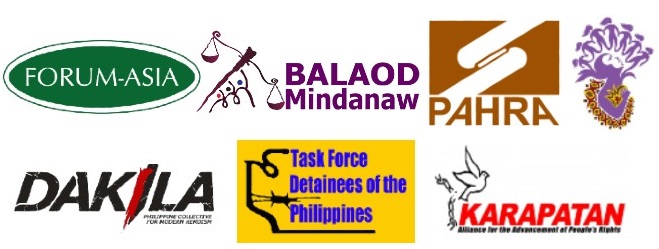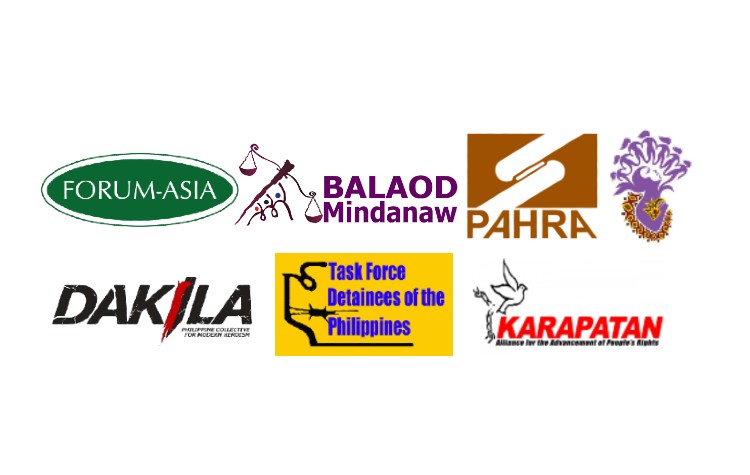
The State of the Nation under Duterte:
Four years of deteriorating human rights and democracy
(Bangkok, 27 July 2020) ‒ Duterte’s four years in power have been characterised by the systematic erosion of human rights, and the failure of governance and democracy, said the Asian Forum for Human Rights and Development (FORUM-ASIA) and six of its member organisations in the Philippines, ahead of the President’s State of the Nation Address today.
The member organisations are Balay Alternative Legal Advocates for Development in Mindanaw (Balaod Mindanaw), Karapatan Alliance Philippines (Karapatan), LILAK (Purple Action for Indigenous Women’s Rights), Philippine Alliance of Human Rights Advocates (PAHRA), Philippine Collective for Modern Heroism (Dakila) and Task Force Detainees of the Philippines (TFDP).
Duterte’s signature policy, the ‘war on drugs’, has led to the deaths of an estimated tens of thousands, including children. The police, the main perpetrators, are accused of extrajudicial killings, torture, enforced disappearances, and sexual abuse.[1] The Office of the UN High Commissioner for Human Rights (OHCHR)’s report on the human rights situation found inconsistencies over several police reports on anti-drug operations and a persistent impunity over these killings.[2]
‘This culture of impunity and a rapidly deteriorating civic space makes it all the more imperative for the international community to push for an international investigative mechanism for these killings and other human rights violations,’ said the rights groups.
Duterte has encouraged and sanctioned this impunity, calling for the killings of drug users, promising protection towards police officers who kill them, and threatening violence against human rights defenders and critics.[3]
The space for dissent continues to shrink. Human rights defenders and activists are often tagged as terrorists, and face reprisals and attacks for their work. FORUM-ASIA documented 95 cases of violations against defenders from 2017 to 2019, with the Philippines having the highest number of killings of human rights defenders in Asia. Among the 95 cases, violence, judicial harassment, intimidation and threats were the most common types of violations recorded.
Media institutions including Rappler and ABS-CBN, along with their journalists, have faced verbal threats and state-sponsored harassment over their reporting on the ‘war on drugs.’[4]
COVID-19
The government’s response to the COVID-19 pandemic mirrors its narrative on the ‘war on drugs’, primarily in the use of violence, intimidation and judicial harassment against suspected quarantine violators, critics and human rights defenders. This response has been characterised by inefficiency and a disregard for the welfare of its people, particularly the most vulnerable communities. Despite imposing one of the strictest lockdowns in the world, the Philippines has one of the highest fatality rates in Southeast Asia.[5]
Under the cover of COVID-19, the government escalated attacks on civic space. A ‘fake news’ provision in an emergency decree became a pretext for arresting critics on social media, often without warrants.[6] The Anti-Terrorism Law, containing unconstitutional provisions that would clamp down on fundamental freedoms was fast-tracked by Congress without any meaningful consultation and despite public opposition.[7]
Economic, social, and cultural rights violations remain unaddressed against rising unemployment, homelessness and landlessness, along with continuing environmental destruction and plunder of natural resources. Social services and aid for the marginalised sectors of society, particularly during the COVID-19 pandemic, have been scarce and inadequate.[8]
‘With the Philippine government’s continued failure to acknowledge its role in committing grave human rights violations, it is crucial for the international community to push for an international investigative mechanism for the extrajudicial killings and other violations connected to the ‘war on drugs’ to ensure accountability and redress for the victims,’ the rights groups added.
When Duterte promised change in his election campaign four years ago, few could have foreseen the extent of damage to democracy and human rights he had in mind. Without accountability, the government’s abuse of power will only continue undeterred, compromising the rights and the welfare of the people. -Ends-
For further information, please contact:
East Asia and ASEAN Programme, FORUM-ASIA [email protected]
For media inquiries, please contact:
Melissa Ananthraj, Communication and Media Programme Manager, FORUM-ASIA
NOTE TO EDITOR:
The Asian Forum for Human Rights and Development (FORUM-ASIA)
(FORUM-ASIA) is Bangkok-based regional network of 81 member organisations across 21 Asian countries, with consultative status with the United Nations Economic and Social Council, and consultative relationship with the ASEAN Intergovernmental Commission on Human Rights. Founded in 1991, it has sub-regional offices in Geneva, Jakarta, and Kathmandu and works to strengthen movements for human rights and sustainable development through research, advocacy, capacity-development and solidarity actions in Asia and beyond.
MEMBER ORGANISATIONS:
BALAOD Mindanaw works with marginalised sectors and communities in Mindanaw through alternative lawyering and paralegalism, stressing active non-violence as an integral part thereof in the advancement of justice, gender equality, and resource tenure improvement in the context of active people’s participation in Governance
DAKILA – Philippine Collective for Modern Heroism is an organisation of artists, cultural and development activists, students, young professionals and individuals building a movement of heroism towards social transformation. Dakila cultivates one’s innate heroism, organises communities of heroes and creatively fosters social involvement by building one’s capacity to make change, influencing individuals and groups to be part of the movement for change, and taking on advocacies and social concerns to bring about strategic actions that make real change. https://www.facebook.com/dakila.philippines/
Karapatan is an alliance of individuals, groups and organisations working for the promotion and protection of human rights in the Philippines. Its founders and members have been at the forefront of the human rights struggle in the Philippines since the time of Marcos’ martial law regime. https://www.karapatan.org/
LILAK (Purple Action for Indigenous Women’s Rights) is an organisation of indigenous women leaders as well as feminists, anthropologists, human rights advocates, environmentalists and lawyers who support the struggle for indigenous women’s human rights. LILAK has consistently contributed to the development of the cause of indigenous women focusing on cultural empowerment, economic empowerment, social empowerment, and political empowerment through advocacy, leadership development, and movement building.
http://lilak.net/
The Philippine Alliance of Human Rights Advocates (PAHRA) is a non-stock, non-profit alliance established on August 9, 1986 in a Congress that was participated in by more than a hundred organisations from all over the Philippines. It was formed as an alliance of individuals, institutions and organisations committed to the promotion, protection and realisation of human rights in the Philippines. https://philippinehumanrights.org/
The Task Force Detainees of the Philippines (TFDP) is a non-profit, national human rights organisation concerned with documenting human rights violations, assisting victims and their families for material and legal needs, and conducting human rights education work. TFDP bases its work on the standards established by the Universal Declaration of Human Rights, the Declaration on the Right to Development, International Covenant on Civil and Political Rights, the International Covenant on Economic, Social and Cultural Rights, the Convention on the Elimination of Discrimination Against Women, the Convention on the Rights of the Child and other international human rights instruments.
[1] https://www.reuters.com/investigates/section/philippines-drugs/
[2] https://www.aljazeera.com/news/2020/06/impunity-drug-war-killings-philippines-200604041319925.html
[3] https://www.aljazeera.com/news/2020/06/kill-philippines-duterte-renews-drug-war-threat-200605040527022.html
[4] https://www.washingtonpost.com/world/2020/06/23/maria-ressa-philippines-democracy-duterte/
[5] https://www.aseanbriefing.com/news/coronavirus-asia-asean-live-updates-by-country/
[6] https://newsinfo.inquirer.net/1262341/poet-posts-bail-for-covid-19-fake-news-case
[7] https://forum-asia.org/?p=31856
[8] https://www.aljazeera.com/news/2020/04/poverty-punished-philippines-tough-virus-pandemic-200413063921536.html
***
For a PDF version of this joint press release, please click here



